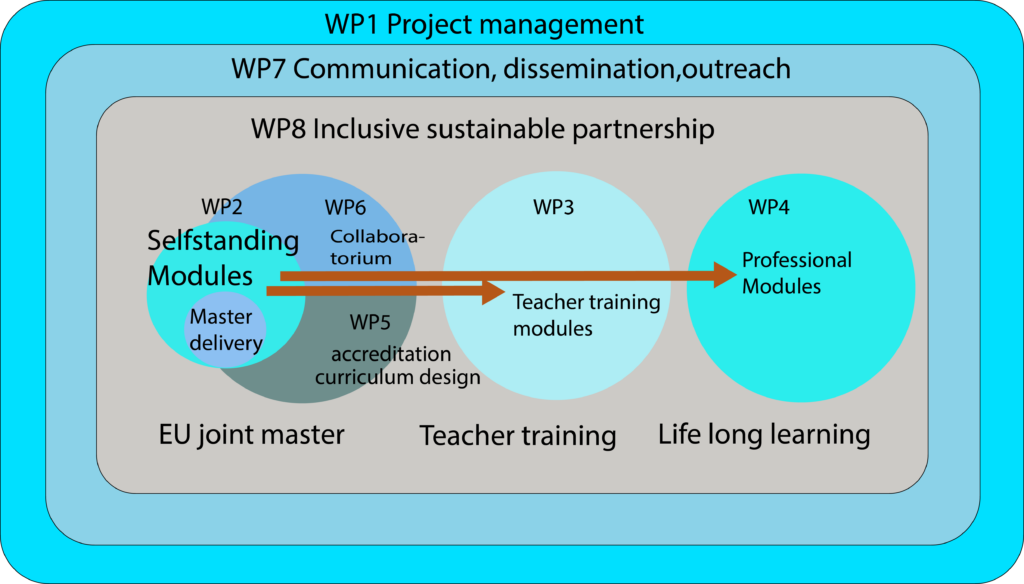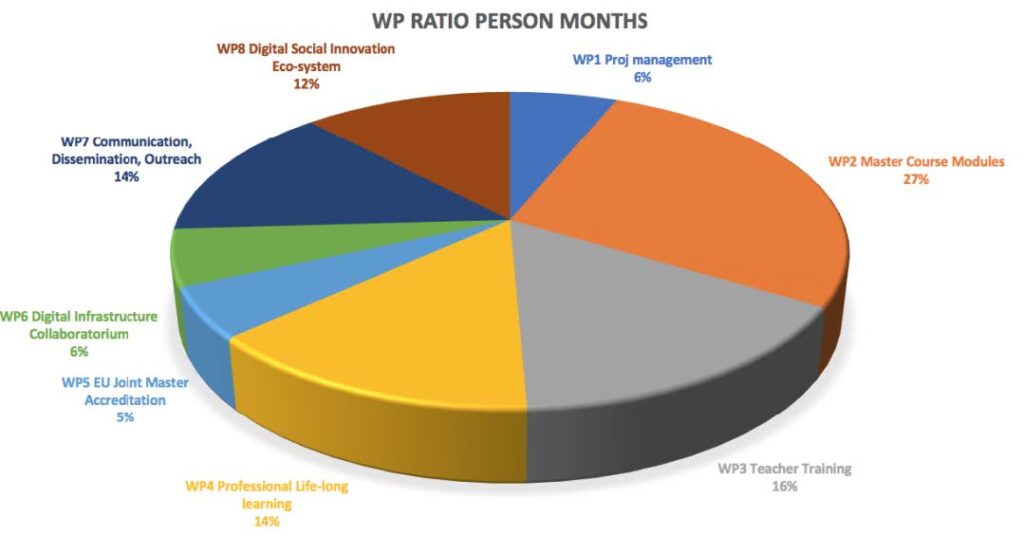In EURIDICE, all activities are grouped into eight work packages. These are coordinated and implemented by the various consortium partner organizations. For each work package partners collaborate in a different constellation. Collaboration, knowledge sharing and communication between the various work packages and partners are at the heart of the project.

The diagram shows the coherence between the various work packages of EURIDICE. The relative time effort between the various work packages is shown in a pie chart.
Design, accreditation and implementation of the European Joint Master Curriculum “Digital Society, Social Innovation and Digital Citizenship” (WP2 and WP5).
The EURIDICE master stands for inclusive education as a basic principle. It is open to all student groups and caters for students with a wide range of non-ICT bachelor backgrounds. EURIDICE education has the ambition to attempt to bridge this science-humanities gap as we believe that social digital innovators of the future need skills from both perspectives. – Master Modules, Curriculum Design and European Accreditation (Work packages 2 and 5)
Design and delivery of Teacher Education Modules (Work package 3) see slides
Content design, delivery and certification of teacher training modules.
It is noted that the partner universities in EURIDICE are at the highest quality levels of education, as they are research-intensive universities with big research departments. Accordingly, updating education in line with the latest research, developments and advances in science and technology is part and parcel of the standard operating procedures of research universities.
This is further enhanced by (i) active and regular quality assurance through the EURIDICE Microcredential Review and Certification Board; (ii) teacher and executive trainings and upskilling through microcredentials; (iii) close cooperation with business and industry through an internship programme and (iv) embedding of the programme in interdisciplinary research programmes on the Digital Society in the participating universities and institutes; (v) EURIDICE’s research seminars inviting high-level experts from within and outside the EU presenting and discussing the latest research.
Professional training: content design, delivery and certification (Work package 4) see slides
EURIDICE addresses the pressing need for digitally skilled professionals who can work in and drive the Digital Transition in Europe. This is in line with the Digital Europe Programme to operationalize the EU’s policies for the Digital Decade, and aligns with four goals of the Digital Compass: (i) Digitally skilled professionals; (ii) Secure and sustainable digital infrastructures; (iii) digital transformation of business, with special focus on SMEs; (iv) digitalization of public services.
EURIDICE contributes directly to this through its educational programmes, its Collaboratorium concept; collaboration with innovative tech SMEs and societal institutions, and through the EURIDICE Social-Educational Digital Ecosystem and its internship programme.
Collaboratorium: an educational concept with a digital infrastructure and student support for blended international hybrid education (Work package 6)
One of the three innovations offered by EURIDICE is its educational concept: the Collaboratorium for Blended International Hybrid Learning, in which students collaborate in groups with their peers in a hybrid (simultaneously face-2-face and virtual) space. To make this possible, digital facilities, equipment and infrastructure including physical collaborative spaces will be designed for the delivery of this educational concept in the joint master. This will be done at the premises of the degree-granting universities.
Communication, dissemination, outreach (Work Package 7) see slides
EURIDICE’s communication narrative will explain the objectives, shared values, interests and impact, read more…
Digital Social Innovation Ecosystem (Work package 8) see slides
EURIDICE takes concrete measures to shape sustainable and structured partnerships between SMEs, institutes and academic and cultural partners, that will live beyond the lifetime of the project and lead to the emergence of a European Digital Social-Educational Innovation Ecosystem, read more…
Relative effort pie chart
